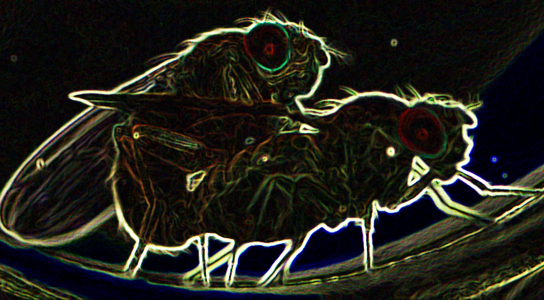It looks like you're using an Ad Blocker.
Please white-list or disable AboveTopSecret.com in your ad-blocking tool.
Thank you.
Some features of ATS will be disabled while you continue to use an ad-blocker.
2
share:
Sex Deprived Fruit Flies Consume More Alcohol

While studying male fruit flies, researchers discovered that sexually deprived flies will consume more alcohol than sexually satisfied male flies and that the flies’ behavior changes as the levels of neuropeptide F in the brain change.
Sexually deprived male fruit flies exhibit a pattern of behavior that seems ripped from the pages of a sad-sack Raymond Carver story: when female fruit flies reject their sexual advances, the males are driven to excessive alcohol consumption, drinking far more than comparable, sexually satisfied male flies.
The new work may help shed light on the brain mechanisms that make social interaction rewarding for animals and those that underlie human addiction. A similar human molecule, called neuropeptide Y, may likewise connect social triggers to behaviors like excessive drinking and drug abuse. Adjusting the levels of neuropeptide Y in people may alter their addictive behavior—which is exactly what the UCSF team observed in the fruit flies.
“If neuropeptide Y turns out to be the transducer between the state of the psyche and the drive to abuse alcohol and drugs, one could develop therapies to inhibit neuropeptide Y receptors,” said Ulrike Heberlein, PhD, a Professor of Anatomy and Neurology at UCSF, who led the research.
Clinical trials are underway, she added, to test whether delivery of neuropeptide Y can alleviate anxiety and other mood disorders as well as obesity.
Source: Jason Bardi, University California San Francisco
Image: G.Ophir/UCSF
Video © Science/AAAS
This is quite an interesting experiment. This neuropeptide Y molecule seems to be the cause of one drowning their sorrows and wanting nothing more than to see the bottom of a bottle (or can, depending on preference) if their sexual "needs" are not being met sufficiently.
Even better (supposedly), clinical trials are already underway to test this molecule in regards to anxiety and mood disorders. If they decide to test it regarding ones sexual needs and if not met, having the potential to thwart addictions to alcohol to suffice what they are lacking, then I suppose that would be a good thing.
Now what they need to do is give these flies currency, and see how many males and females for that matter turn to alcohol or drugs when they don't have enough of it to make ends meet.
Seemingly, they are looking to make a legal and true to life "Eff-it-All" pill. They keep getting closer and closer. In order to have full control that's what they'll need, oh and a very effective marketing campaign
hmm maybe there could be a relation to humans/?
seems to me though that in the case of the flys if they arnt having sex their doing just about anything else they can be doing (flying around for the entire day of their life) and if theres alcohol arount them theses a good chance they'd start drinking it
interesting find
seems to me though that in the case of the flys if they arnt having sex their doing just about anything else they can be doing (flying around for the entire day of their life) and if theres alcohol arount them theses a good chance they'd start drinking it
interesting find
reply to post by UberL33t
And what about guilt as an underlying cause of alcoholism? Is the research really pointing to a frustrated sex drive or should it point to a failure to deal with rejection?
At the end of it though, I'm still left with the question as to how to get rid of the pesky things.
And what about guilt as an underlying cause of alcoholism? Is the research really pointing to a frustrated sex drive or should it point to a failure to deal with rejection?
At the end of it though, I'm still left with the question as to how to get rid of the pesky things.
reply to post by UberL33t
they also live longer fact but can not foir the life of me remember where
i got the info from some space experiment i think
they also live longer fact but can not foir the life of me remember where
i got the info from some space experiment i think
new topics
-
A fix for the Trans players in sports
Social Issues and Civil Unrest: 1 hours ago -
Petition Calling for General Election at 564,016 and rising Fast
Political Issues: 4 hours ago -
Rep. Alexandria O. Cortez Says Forcing People to Use The Correct Bathroom is Dangerous.
US Political Madness: 10 hours ago -
Cooperation zones
World War Three: 11 hours ago
top topics
-
France gives Ukraine license to fire long-range missiles at Russia
World War Three: 15 hours ago, 9 flags -
Petition Calling for General Election at 564,016 and rising Fast
Political Issues: 4 hours ago, 9 flags -
Rep. Alexandria O. Cortez Says Forcing People to Use The Correct Bathroom is Dangerous.
US Political Madness: 10 hours ago, 5 flags -
Ok this is some BS now WTH
Rant: 13 hours ago, 4 flags -
A fix for the Trans players in sports
Social Issues and Civil Unrest: 1 hours ago, 4 flags -
Cooperation zones
World War Three: 11 hours ago, 3 flags
2
